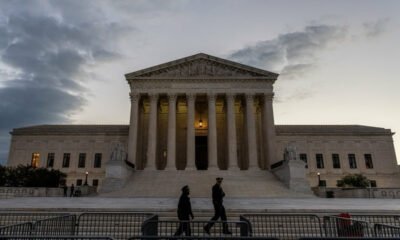Adrian Fontes
Court Ruling Unleashes 218,000 Names of Voters Amid Citizenship Proof Controversy

A recent court decision has granted access to the names of approximately 218,000 Arizonans who may not have provided proof of citizenship for voting. This ruling comes after the Arizona Court of Appeals rejected a request from Secretary of State Adrian Fontes to prevent this data from being shared with Strong Communities Foundation.
Appellate Judge Michael Catlett, representing the three-judge panel, stated that Fontes failed to demonstrate any errors in Maricopa County Superior Court Judge Scott Blaney’s order to release the information. Fontes remains concerned about potential risks associated with disclosing the voters’ identities, citing fears of harassment and intimidation from extreme political factions.
In a press conference, Fontes expressed apprehension regarding plans to target voters over political disagreements. “I think they’re planning on going after voters who they might politically disagree with,” he said. This sentiment echoes broader concerns about voter intimidation in the current political climate.
Merissa Hamilton, head of EZAZ.org, asserts that their organization does not intend to disturb voters. The court ruling currently prohibits any direct outreach to the individuals on the list until after Wednesday, emphasizing a focus on working with county recorders to validate voter eligibility ahead of the next election.
Hamilton indicated that this release aims to enable county officials to assess the eligibility of these voters. However, the ruling leaves room for misuse, allowing others to leverage this information to question election outcomes based on illegal voting allegations.
Fontes criticized the motives of Strong Communities, a group associated with conservative agendas, claiming they prioritize their investigation over voter rights. “They believe that their right to investigate and harass voters is more important than the voter’s right to cast a ballot,” he remarked.
The court’s decision also permits Hamilton to share the list with key legislative figures and committee members, some of whom have publicly expressed doubts about the 2020 and 2022 election results. The controversy surrounding the citizenship status of those on the list could ignite new legal challenges in closely contested races.
In previous elections, razor-thin margins demonstrated how significant even small groups of voters could be. For instance, Donald Trump lost Arizona by just 10,457 votes in 2020, while Kari Lake lost the gubernatorial race by 17,117 votes in 2022.
Hamilton addressed the potential for the list to expose eligible voters at risk of disenfranchisement, noting that some individuals have been wrongly denied the right to vote due to citizenship verification issues. This concern highlights ongoing challenges faced by the Maricopa County Recorder’s Office as they strive to correct misinformation regarding voter eligibility.
Rectifying these errors is paramount, particularly as the Arizona Supreme Court ruled that all individuals on the list may cast a full ballot this election year, despite questions regarding their citizenship status. A glitch in the motor vehicle department’s records initially inflated the number of voters potentially lacking citizenship proof.
The legal controversy traces back to a voter-approved law from 2004 requiring proof of citizenship for voter registration, yet complexities within the system have compounded the issue. A recent ruling deemed it critical to address these discrepancies rather than risk disenfranchising legitimate voters.
As the situation develops, Hamilton urges a thorough review of the voter rolls and advocates for independent audits to ensure the integrity of Arizona’s voting system amidst ongoing scrutiny and debate regarding voting rights.


















